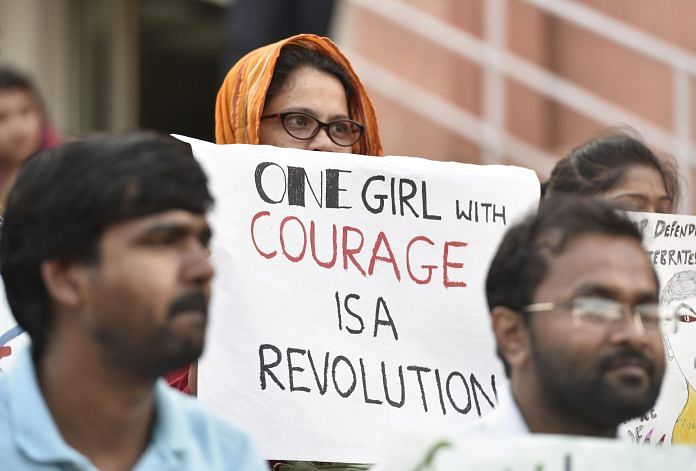#MeToo is a time for celebration, anger and joy. But this phase must also make space for grief, forgiveness and healing.
The last few days of #MeToo in India have been akin to watching a volcano erupt at a distance. The purge has been one of the most majestic and cathartic sights the Indian internet has been witness to. The juggernaut that Tarana Burke’s work started landed in India through Raya Sarkar’s LoSHA, and has now percolated down to the media on Twitter.
But it’s also a moment when some of us have realised that a lot of men in our lives – men we trusted, loved and championed – were probably terrible to someone else. This difficult realisation is compounded by the fact that a lot of people will blame you for the man’s actions. Variations of ‘you were his friend, why didn’t you know? Were you protecting him?’ will echo around you.
As we create a new language for boundaries, consent and harm, some old wounds find description too. Harm done years ago by people we have come to trust is suddenly being unearthed. Harm done to us, which we carried as just a ‘feeling’ for long, is resurfacing painfully as a reality.
Also read: #MeTooIndia can change the way we treat women in India
This, of course, is not pretty.
It’s heartbreaking because empathising with the survivor’s pain, contextualising your friend’s role in it, and processing all the emotions makes one malfunction. Self-preservation kicks in, and often includes the abuser in its ambit. ‘I know my friend,’ you justify to yourself. ‘Maybe she didn’t understand? Maybe it’s a lie?’
It’s not very woke to admit to these moments of weakness, of course. You are exposing your own vulnerabilities, but you have to admit that sometimes doing the right thing isn’t the first thought you have. The uncool, unwoke truth is that we’re all cripplingly human and flawed. We love our friends deeply without understanding the consequences of it. That love is often weaponised against us, even as we are not given enough time to adjust to the new reality.
So, how does one react when a friend, a husband, a brother, a man you care about is outed for sexual misconduct?
First, pause. Take a deep breath. People will come to you with pitchforks and demand answers. You do not owe them any. Do not say things in haste because your initial reaction will be to support your friend. Hold on. Take a step back, and take stock of the situation.
Now, reach out to the person in question. Yes, it’s easy to say that you should out them immediately, but reach out to them. Observe how they defend themselves. Is it calm? Is it an overreaction? Is it a dismissal? Trust your gut with this one. If you’re friends, you might be able to tell when a person is lying. Even if you can’t, you’ve given them fair context for the next step.
This is where you have to decide what you want to do next. Do you want to call them out? Do you want to sit this one out? Do you want to reach out to the survivor and offer help?
Also read: Utsav Chakraborty harassment cases: Wake up call for comedians or social media shaming?
Khaled Hosseini in A Thousand Splendid Suns said, “Like a compass needle that always points north, a man’s accusing finger always finds a woman.” That holds true here too. Whatever you do, you’re probably going to be castigated for not doing enough. If you call the person out, you will be rebuked for not doing it sooner. There is no win here, no moral victory, just a reduction of harm. That is something you must remember.
To confront those we love takes courage and an acknowledgement of grief. To quote Harry Potter’s Dumbledore, “It takes a great deal of bravery to stand up to our enemies, but just as much to stand up to our friends.” But it’s not something you can do lightly. Why? That’s because we’ve grown up with the idea of a molester as a ‘monster’ in our heads. It’s rankling to realise that people who harass, molest, make women uncomfortable are not your typical monsters. They’re people around us who are capable of doing monstrous things and then coming back to be the good people we think we know them to be. It is important to acknowledge that we don’t know enough about the people we love, and the things we find out might break our hearts.
This is not to say good people, kind people do not exist. A lot of trolling is about how ‘feminist’ men are being outed and hence, obviously, men cannot be feminists. I disagree. There will always be people who manipulate and exploit, yes, but there will also always be people who will come through in the darkest times. What is happening now is just a long overdue upheaval caused by people drawing energy, inspiration, and support from a collective.
Also read: #MeToo storm gets Symbiosis media college to act against ‘harassment culture’ on campus
This is a time for celebration and anger and joy, yes. But this phase must also make space for grief, forgiveness, and healing. A lot of people have been hurt in multiple ways by the acts of people they trusted and looked up to. The paucity of faith is stark and difficult to question. It’s going to take years for worlds torn apart to stitch themselves back.
One of my favourite songs by Florence+The Machine goes ‘…it’s always darkest before the dawn’. Personally, at least, I’m going to cling to that. It will be dawn soon. And, hopefully a happier one.
The author is a poet.



